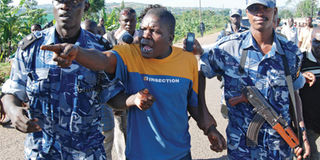Donors attack government over walk campaign

A man engages a police officer on Monday when the force engaged civilians who were walking to work in protest of the rising fuel prices. PHOTO BY ISAAC KASAMANI
Kampala
Members of the international community have denounced police handling of the walk-to-work campaign on Monday as an affront to Ugandans’ civil and human rights.
Forum for Democratic Change (FDC) leader Kizza Besigye and Democratic Party (DP) leader Norbert Mao were violently arrested along with several other opposition politicians and charged with inciting violence after participating in the walk-to -work effort against the rising fuel prices and cost of living in the country.
Peaceful walkers, along with primary school children caught in the fracas, were also tear-gassed by police.
Yesterday, the US government issued a statement voicing concern over the matter. “Freedoms of expression and peaceful assembly are fundamental human rights and a critical component of functioning democracies,” said Mr Mark Toner, US State Department deputy spokesman.
“We call on the Ugandan government to respect the opposition’s right to express its viewpoints and citizens’ rights to demonstrate peacefully and without fear of intimidation,” he said. The British government echoed the US position on supporting fundamental freedoms that allow for peaceful protest and suggested the police had abused their powers. “We also encourage the Uganda Police Force to respond proportionally to public order situations,” said a statement from Mr Chris Ward, Head of Communications for the British High Commission in Kampala.
Human rights record
The reactions come days after US Secretary of State Hillary Clinton released a human rights report that questioned the consistent abuse of power by security forces in Uganda. Joann Lockard, public affairs officer at the US embassy in Uganda, said while the Western country is concerned by the threats to citizen freedoms, democracy and human rights is just one part of an ongoing dialogue between the two countries.
“We continue to work with the Ugandan government and Ugandan law enforcement to respect human rights, to support democratic development in Uganda and will continue to do so,” she said. President Museveni’s government has long been widely considered an ally of the West in their shared positions on economic reforms and the global fight on terrorism.
On Monday, rights group Amnesty International said Uganda’s “unjust ban on public rallies” is part of an unlawful “blanket ban against all forms of public assemblies” that has been in place since the conclusion of the February general elections, on the grounds of ensuring public security. But Internal Affairs minister Kirunda Kivejinja yesterday insisted that security personnel were operating within Uganda’s laws. His views, however, ran counter to the Uganda Law Society’s whose president Bruce Kyerere said the police position that protests must first be cleared with government is untrue.
The law body, which is mandated to guide the public and government on matters of law, also said in a statement that they “note with great concern the prevailing situation/events in the country orchestrated by the Police Force under the command of Inspector General of Police, Maj. Gen. Kale Kayihura, leading to the brutal dispersal and arrest of peaceful demonstrating [walking] citizens especially targeting opposition parties.” “This brutal conduct by state security agencies [Police] shows a gradual decline in governments’ commitment to good governance; rule of law and observance and protection of human rights as well as adherence to democratic principles.”




